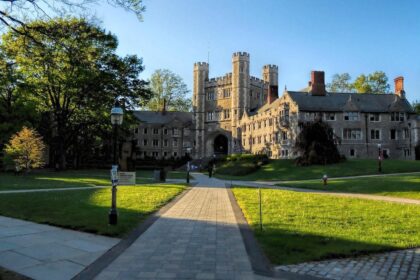
In a few weeks, I’ll be in New Jersey, a part of the world that holds a very special place in my heart, as does nearby Philadelphia, thanks to family, foundational memories as a child and with my own kids, and now as roots to call a home. With that trip in mind, I could not have been more delighted than to see the news of New Jersey’s embrace of film, one of the sectors of a regional economy that I’ve come to find leads startups. I love to use movies as analogies for entrepreneurship but what we’ve witnessed through Silicon Valley, Austin and Texas, and Georgia, is that the creative class inspires the difference between tech and innovation.
When the creative class (filmmakers, media producers, musicians, authors, artists, and cultural entrepreneurs) flourishes, so do startups. And if you think that’s a fanciful notion, the newly turbo-charged ecosystem in New Jersey startups is proof that culture, influence and entrepreneurship are not separate tracks, they feed the same engine.
Article Highlights
- The Garden State’s DNA: Innovation, Industry & Culture
- Inventions and Innovation History: Proof on the Ground
- Macro Economy + Government’s Role in Entrepreneurship
- Notable Companies & Startup Development Organizations
- The Film & Creative Investment Signal: Why New Jersey Took the Move
- Texas, Georgia… Why New Jersey Could Be “Next”
- How New Jersey Startups Measure Up in 6 Considerations
The Garden State’s DNA: Innovation, Industry & Culture
New Jersey isn’t a “second tier” startup market simply because it’s adjacent to New York and Philadelphia. It’s what we’d call a legacy ecosystem built on invention, infrastructure, and adjacency (similar to Bellevue to Seattle). The human geography of New Jersey gives it a unique mix of “big market access” plus “almost-affordable scale” (the analog of Austin vs. Silicon Valley, but older).
The New Jersey Economic Development Authority (NJEDA) says New Jersey excels at “unmatched, diverse talent” and the “largest tech talent pool in the US” by proximity. It also reminds you that from “the incandescent light bulb to ground-breaking cancer research, New Jersey has been … a place where human ingenuity flourishes.”
From a culture perspective, the state has been the birthplace of American cinema, with early film experiments in the late 19th and early 20th century, so when you hear “was Hollywood before Hollywood”, it applies. So, when a major studio investment lands here, it’s not just location arbitrage, it’s tapping into a deep heritage of culture + creativity.
In startup parlance: startups are not just code and SaaS (you should know this by now, despite many still arguing it’s just STEM and tech). They are stories, brands, markets, influence. If you invest in the creative class, you create magnetism: talent wants to be where there is both innovation and culture. That magnetism attracts entrepreneurs, investors and attention.
Inventions and Innovation History: Proof on the Ground
If New Jersey were a startup founder, its “track record” slide would be a highlight reel of innovations. Consider this:
- Thomas Edison set up his Menlo Park laboratory in what is now Edison Township, New Jersey — his lab is where the commercial light bulb, phonograph, motion-picture camera and more came into being.
- Bell Labs in Holmdel, New Jersey delivered world-changing inventions: the transistor, laser technology and more.
- The New Jersey Inventors Hall of Fame records dozens of key inventions tied to the state, from telecommunications to pharmaceuticals.
My point: entrepreneurs often ignore history, yet New Jersey has deep technical roots and a culture of invention; which means for startup founders it’s not just “rent cheaper than NYC” but this place has innovation ingrained.
Macro Economy + Government’s Role in Entrepreneurship
Let’s be frank: innovation ecosystems don’t emerge by accident. State policy, infrastructure, incentives and institutions matter. New Jersey has been aggressive in building startup-friendly instruments.
- The Angel Investor Tax Credit Program: investors who put money into qualified New Jersey “emerging technology” companies can get tax credits (10% of qualified investment up to $500K) through the New Jersey Economic Development Authority (NJEDA).
- The Angel Match Program matches angel investment on a 1-to-1 basis (convertible notes, etc) for eligible early-stage product-based companies.
- Programs like NJ Founders & Funders provide structured introductions between startups and sophisticated angels/VCs.
- The Innovation Evergreen Fund: a public-private LP model co-investing state capital raised from auctioned corporate tax credits ($300 million program) alongside qualified VCs.
- NJ Accelerate matches cash investments made by approved accelerators (up to $250k) and covers six months of coworking rent (up to $25k).
- New Jersey Innovation Fellows which provides income-replacement grants for first-time founders ($200k–$400k per team) plus mentorship and AI-focused cohorts.
- Princeton-anchored AI Hub and Next NJ Initiative public-private center with tax-credit and grant frameworks to spur AI and data-center startups.
As well as VentureLink @ NJIT, Stevens Venture Center, Princeton Innovation Center BioLabs, Rutgers TechAdvance, and HAX Newark (SOSV) anchor the incubator/accelerator network. TechUnited:NJ and BioNJ tie the statewide private sector together.
In my economic development talks throughout the world, almost everywhere is pointing out that it’s time for Corporate and University IP to explore new commercialization models because society is sitting valuable research going nowhere. Imagine my surprise at a wonderful coincidence of timing as Mary Jane Durkin announces, “The NJII Venture Studio helps corporates turn underused innovation into startups without the overhead or risk of doing it internally.” The New Jersey Innovation Institute leverages the resources of an R-1 research university, and deep industry and government partnerships, to accelerate technology, foster innovation, and drive workforce development.
All of this is telling about where you too should be going as an ecosystem: culture-class investments (film, creative, media) don’t just happen; you need place infrastructure, tax/incentive logic, and ecosystem architecture – the exact same thing you need for entrepreneurship and innovation to be viable as well. New Jersey has been building that. IP doesn’t commercialize itself; you need bridges to entrepreneurs such as my Bow Tie scenario or what NJII is doing.
On the macro-economy side: New Jersey brings location advantages (Northeast Corridor transit, dense population, talent access), and the fact that it sits next to two major metro areas gives startups a large marketplace while allowing some cost advantage.
So, as an ecosystem architect or economic-development professional the conditions are present: talent, history, incentive, location. What could be stronger is narrative, culture, and visible “shiny things” that signal success (which is why I’m diving in here and why you all need to know creative class investment is critical).
Notable Companies & Startup Development Organizations
Who is doing what, where are the funnels, who are the funds?
While not exhaustive, recent snapshots show growth: According to NJEDA’s monthly investment summaries, Garden State companies continue to attract capital and rank in the top 10 states for VC dollars.
Cities like Newark are on top of things, Bill Hartnett and Jersey Digs, “The annual Newark Tech Week … featured a strong focus on AI … and plenty of networking opportunities.”
- HAX Accelerator: hard-tech, headquartered in Newark. The NJ partnership with SOSV (its parent) expects to launch 100 hard-tech startups.
- JumpStart NJ Angel Network: a member-led network of experienced entrepreneurs and VCs investing in early-stage tech ventures in New Jersey and the Mid-Atlantic that funnels personal angel capital.
- TiE New Jersey Angels: a broader angels community focused on high-growth ventures.
- Newark Venture Partners (NVP) early-stage VC/accelerator.
- Prysm Capital: a growth equity/VC firm active across technology, consumer, healthcare.
- Foundation Venture Capital Group: Princeton-based, focusing on pre-seed/seed in health-tech and innovation ventures.
New Jersey has multiple entry points for startups, not just in tech but across sectors including creative/production adjacent sectors where we started.
The Film & Creative Investment Signal: Why New Jersey Took the Move
Let’s zoom in there: The state’s investment in its creative class, particularly the film/TV production infrastructure at Fort Monmouth.
Netflix broke ground on its East Coast flagship production campus at Fort Monmouth in May 2025: a roughly $1 billion transformation of a former U.S. Army base (292-acre site) into a high-end production campus with 12 soundstages and 500,000 sq ft of production space.
This creative-class move strategic because film/TV production brings high-visibility, foot traffic, related service-jobs (design, set-construction, hospitality) and culture-capital. This is not just about the studio; it’s about building infrastructure that signals they’re serious about creativity, content, culture, entrepreneurship.
On November 1, Paramount Pictures committed to occupy more than 285,000 sq ft of space.
“This is more than a studio; it’s a statement,” said Governor Phil Murphy at the Netflix groundbreaking ceremony. “New Jersey is open for creative business — and Netflix is leading the charge,” adding later at the opening of the NJ AI Hub, “we are moving forward in establishing New Jersey as a global leader in technology and innovation.”
- The creative class investment builds culture, which builds talent. Having a vibrant production ecosystem will mean more creative professionals, marketers, storytellers, freelancers, vendors, studios: a ripple into enablement for startups.
- It draws attention: when media and production flow, that draws external talent, press, capital. It creates a “cool factor” which helps attract startups that thrive on culture and narrative.
- It diversifies the economy: not all startups are SaaS; many integrate media, entertainment, content, design, creative-tech. With production infrastructure in place, those adjacent sectors become viable locally instead of forced to move to L.A. or Atlanta.
- It sends a signal abroad: if New Jersey is paying attention to culture + infrastructure, then it means local policy and capacity exist for creative entrepreneurship.
In other words: New Jersey is not just offering tax credits; it’s building place-assets. That’s rare.
Texas, Georgia… Why New Jersey Could Be “Next”

Now, a lot of what I’m framing here has to do with my personal experience in Texas with the supposed Live Music Capital of the World and what used to have substantial Texas Film Incentives. Those identities and resources played a large part in being a catalyst for the boom of startups beyond Silicon Valley into Austin and the rest of Texas.
In Texas, the draw of live music and film subsidies (now restored after being ended during years of politics) have helped build creative-tech clusters (game dev, VR, MusicTech). When Texas killed the film incentives, Georgia picked up where production was left to languish as a Georgia leaned in, we started seeing that Georgia Peach logo as film credits rolled; the film-production infusion there also nurtured a broader ecosystem of digital media, game studios, startup ventures.
These states have pursued entertainment/creative investments and then reaped startup/entrepreneurial spill-overs.
New Jersey is positioning itself to lead next wave on the East Coast:
- Georgia once became the “Hollywood of the South” via large studio infrastructure plus state support. Similarly, New Jersey’s Fort Monmouth investment invites the “Hollywood of the Northeast” framing. Or rather, as one spokesperson appropriately noted since New Jersey was historically first, Hollywood is the West Coast of New Jersey film.
- Key difference: New Jersey is leveraging its proximity to the media capital of New York plus film infrastructure plus startup infrastructure I once hoped more of with Austin: not just production, but innovation.
- If the creative class anchors the “attention economy”, then startups (especially consumer-tech, media-tech, game dev, design-led ventures) will flow to where attention is concentrated.
If you’re familiar with these regional deep dives, I always pull from a framework for economic development of startups, so as I wrap up, let’s head there.
How New Jersey Startups Measure Up in 6 Considerations
1. A Culture of Competition, Potential, and Creativity
New Jersey’s creative class is nothing if not competitive. The state has always lived in the shadow of New York’s cultural gravity, which means everything here (music, film, design, tech) has had to punch harder to be seen. That underdog drive has bred both creative risk-taking and commercial ambition. From Edison’s Menlo Park experiments to the reinvention of Fort Monmouth as a billion-dollar Netflix production hub, New Jersey has repeatedly proven that its creative economy thrives on experimentation. The state’s artistic grit and industrial heritage combine into a culture where failure isn’t fatal, it’s tradition (which is what we want in startups).
2. Reasonable Wealth Available
New Jersey’s capital environment is pragmatic and diverse. Angel investors, family offices, and corporate venture arms form a base of “reasonable wealth” (capital that isn’t chasing hype but looking for solid returns in real industries). JumpStart NJ, TiE NJ Angels, Newark Venture Partners, SOSV, and Foundation Venture Capital Group all operate within that space, investing across hardware, biotech, and creative tech. Add to that the NJEDA’s matching funds and evergreen co-investment platform, and founders here have access to disciplined, early-stage capital without the speculative inflation that distorts other markets.
3. Innovative Employers
Bell Labs, Merck, Johnson & Johnson, Audible, Panasonic, and Prudential anchor the state’s employer landscape and each plays a different role in the innovation chain. These companies not only employ thousands of engineers and researchers but increasingly spin off entrepreneurs and intrapreneurs who seed startups across Newark, Princeton, and Hoboken. The hard-tech accelerator HAX (SOSV) in Newark and the Princeton Innovation Center BioLabs exemplify how corporate and academic R&D pipelines now feed directly into startup formation.
4. Little to No Government Interference
New Jersey’s government has found the rare balance of activist investment without administrative intrusion. The NJEDA and Choose New Jersey act less like bureaucracies and more like economic-development VCs; setting frameworks, not rules. Entrepreneurs aren’t forced through endless licensing or political gatekeeping. Instead, the state uses tax credits, matching funds, and incentive programs to lower friction and let the market operate. In other words, it’s public-sector participation without too much; a distinction that lures startups fleeing over-regulated regions.
5. Access to Startup-Experienced People
The density of New York and Philadelphia’s entrepreneurial networks spills directly into New Jersey, giving founders immediate access to startup-experienced mentors, operators, and investors. This is rare and tough to develop. Rutgers, Princeton, NJIT, and Stevens all run incubators producing new venture talent. Communities like TechUnited:NJ and Propelify connect thousands of founders and investors annually, while accelerators such as HAX and VentureLink @ NJIT ensure a continual pipeline of experienced startup professionals. The human infrastructure here is deep, diverse, and globally networked.
6. Credible and Distinct Promotion of the Region
For the first time in decades, New Jersey’s narrative isn’t defensive, it’s distinct. Film at Fort Monmouth, the Princeton-anchored AI Hub, and the innovation branding from Choose New Jersey all position the state as both culturally magnetic and economically modern. The creative-class investment has given New Jersey a visual and emotional identity that transcends industrial nostalgia. As Texas leveraged music, and Georgia leaned into film, New Jersey is now fusing both with tech to tell a new story: a place where creativity funds itself through entrepreneurship.
New Jersey excels at five of the six considerations outright, and the sixth (global perception) is rapidly catching up. It already has competition, capital, employers, freedom, and experience; what it’s building now is a story big enough to match its record.
Where the state still needs improvement is in capital depth and narrative coherence. The capital stack is sophisticated but the state still exports too many deals to New York funds, meaning founders raise across the river instead of across the street (or from further). Optimistically, the solution to this is in both of those challenges – developing the narrative and distinction draws capital attention. The next leap for New Jersey is to mature its local venture tier, to build the connective tissue between angels, accelerators, and institutional VCs, and to develop global coalitions with Startup Development Organizations that operate throughout the world, to expose and connect everyone to there while providing local entrepreneurs with access to the expertise beyond the region.
For decades, New Jersey has been the quiet genius behind its louder neighbors: inventing the lightbulb, building Bell Labs, and birthing American cinema but letting others take the credit or the reigns. To compete globally, New Jersey must articulate its identity as a birthplace of American innovation re-emerging as a creative-tech powerhouse.
Here’s the challenge to you (readers): Too many economic-development efforts treat “startup” as synonyms for “tech cluster” and ignore the creative class. That’s a mistake. The creative class drives attention, culture, place magnetism, and narrative; all of which are essential to building a dynamic startup ecosystem (especially in consumer-tech, media, content, game dev, creative services).
New Jersey is quietly making the smart play whether they really realize it or not: using its film/production resurgence as anchor for startup growth. If you’re a founder or investor looking for fertile ground outside the obvious hubs, consider that where film studios go, talent flows, services scale, and then startups follow.
Here’s the question I leave you with: If you were designing a startup-ecosystem playbook today, would you first invest in software and SaaS clusters or would you anchor it with culture, media, production infrastructure so that the startup magnetism is built, not assumed? New Jersey is choosing the latter.




This is awesome. Let’s connect while you’re in NJ! Also— great sweatshirt!!
Clark Lagemann – Do you know Paul O’Brien? I’d recommend y’all connecting.
re: “When states like hashtag#Texas and hashtag#Georgia invested in their creative sectors (film, music, and digital media), startup ecosystems followed.”
Huuummmm. I have to wonder (out loud)… Is there enough talent and demand to go around? At what point do things start to thin out, if you will?
Also, I was born and raised in NJ. I graduated from Rutgers (New Bruns). I even worked for AT&T (in Basking Ridge) when telecomm was still part of NJ’s bread & butter. And now it’s pharma / bio-tech, I think.
Sans Bell Labs, which in terms of speed of technology was AGES ago, is NJ cut out for the startup mindset? Or is this mainly NJ siphoning off the overspill from NYC at that startup ecosystem?
Don’t get me wrong. I hope you’re right. Maybe I’m too close to see it? Too close to believe?
p.s. If you’re going to be in Princeton or New Brunswick, both are convenient for me. LMK if you have time for a drink.
Mark Simchock in my experience, it’s a question more so of entrepreneurial culture, appeal, and availability of capital. Cities like to think it’s tech or great universities (which granted, they have), it’s not. Tech moves.
Going to be in Avalon?
Solid write up and kudos to New Jersey Institute of Technology and New Jersey Economic Development Authority (NJEDA) for doing some really innovative stuff for actual growth. Thanks for sharing Paul O’Brien
Mark Simchock thanks for the suggestion. Paul O’Brien, I dropped you an invite.
Creative infrastructure as economic engine—this is it. At Kornerz, we’re applying the same principle to social: small, human-scale spaces where creators don’t just show up, they stay, build trust, and drive lasting value together.
Paul, this creative infrastructure model is fascinating. I’m curious how other states with strong R&D legacies but weaker startup ecosystems might adapt New Jersey’s approach. What specific metrics would you recommend for measuring the transition from creative investment to sustainable venture capital flow and startup density?
Stanislav S. Most states with deep R&D or industrial roots fall into the same trap: they measure inputs (spend, patents, facilities) but not conversion. New Jersey’s creative-infrastructure model COULD work (I don’t that they’re doing this) by treating cultural and intellectual capital as part of the startup pipeline, not as separate “arts” or “research” silos.
If I were building the dashboard, I’d start with three ratios:
1. Conversion rate: the share of creative-class or R&D projects that spin out startups within 3–5 years.
2. Capital velocity: the time from first local investment (grants, film incentives, or angel capital) to follow-on venture rounds from private markets.
3. Density delta: startup formations per 100k residents before and after creative-class investments (e.g., studio builds, incubator openings).
Those metrics reveal whether a region’s creative investment is producing compounding ecosystems rather than temporary construction jobs or press releases or startup accelerator graduates.
Innovation policy has to measure transitions: how culture turns into capital, and how capital turns into companies.
Love it Paul!
This is the exact capability I’m trying to unlock with my project. We need interconnectivity, Access, and activation, and the state needs to be involved at the problem solving level because those solution will fuel the states future economy if prioritized correctly.
Shyon Parsadoust yes
Paul, this creative infrastructure model is fascinating. I’m curious how other states with strong R&D legacies but weaker startup ecosystems might adapt New Jersey’s approach. What specific metrics would you recommend for measuring the transition from creative investment to sustainable venture capital flow and startup density?
Stanislav S. Most states with deep R&D or industrial roots fall into the same trap: they measure inputs (spend, patents, facilities) but not conversion. New Jersey’s creative-infrastructure model COULD work (I don’t that they’re doing this) by treating cultural and intellectual capital as part of the startup pipeline, not as separate “arts” or “research” silos.
If I were building the dashboard, I’d start with three ratios:
1. Conversion rate: the share of creative-class or R&D projects that spin out startups within 3–5 years.
2. Capital velocity: the time from first local investment (grants, film incentives, or angel capital) to follow-on venture rounds from private markets.
3. Density delta: startup formations per 100k residents before and after creative-class investments (e.g., studio builds, incubator openings).
Those metrics reveal whether a region’s creative investment is producing compounding ecosystems rather than temporary construction jobs or press releases or startup accelerator graduates.
Innovation policy has to measure transitions: how culture turns into capital, and how capital turns into companies.
Thanks for highlighting the ecosystem effect. I particularly love the tax credit for Angel investors and the income grants for first time founders.
Did you know that New Jersey is the only state in the nation without a children’s museum? Why should we care? Because children’s museums are where innovation and creativity are fostered for the generations to come. I’m with MOMI – Museum of Makers and Innovators – and we are trying to gain financial investment to build MOMI in Newark, NJ — anyone out there have any ideas for where we can search for support?
Jacqueline, might be a case study with Johnson City, TX (small town outside of Austin / San Antonio). They got an innovative children’s museum off the ground and it was a catalyst for the entire town.